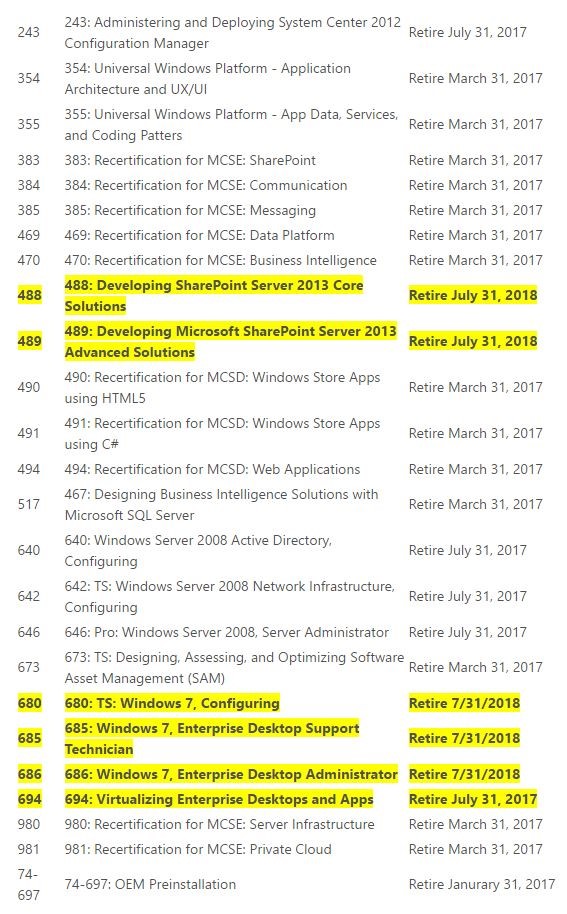Microsoft Wants YOU ... to Start Adopting its New Platforms

It's not often that Certification Watch beats me to a certification news scoop, but this time I learned from Volume 20, Number 3 about the latest news on Microsoft cert exam retirements scheduled for 2017.
The real details come from Liberty Munson — Microsoft Learning's ace psychometrician and cert exam maestra (that's the feminine form of maestro, in case ya didn't know) — in a Jan. 17 blog post with the screamingly matter-of-fact headline Updates on Exam Retirements: January 2017.
This is something Ms. Munson posts about every now and then to keep readers apprised of which exams are about to hit the scrap heap, and this time the list is pretty lengthy. The highlighted items on the list are stuff that's new to the retirement queue, which Microsoft maintains on its Retired Exams page under the heading "Exams scheduled to retire."
That list is only accessible by topic category (Microsoft Dynamics, SharePoint, SQL Server, and so forth) and is nowhere near as easy to read and ponder as is Liberty's List so I was happy to seize the opportunity to chew on it for everyone's benefit.
Here's a snapshot of the list with the new and changed items highlighted in fluorescent yellow (I skipped the Microsoft Dynamics items in the interests of compactness):

What's clear from these retirements is a growing emphasis by Microsoft on moving its certified population forward onto the "latest and greatest" platforms. This has to be deliberate, because the company is not unaware of actual market adoption and uptake of its products.
Thus we find the Windows 7 exams retiring at the end of July, even though the actual Windows 7 OS is still everywhere present. It enjoys a clear majority in the number of overall desktop deployments, and claims far, far more business desktops around the world than its successors.

From the Microsoft corporate viewpoint, Windows 7 is the past, and Microsoft Learning is clearly pushing its certification population into the future. I see the same implicit message in the pending retirement of the System Center Configuration Manager for Server 2012 in July.
The retirement of the SharePoint items is similar, though not exactly the same. In this case, I think Microsoft wants to move people forward to the SharePoint replacement, Skype for Business, rather than seeking them to push forward to a more current release. This is also implied by the pending 2018 retirements of developer exams for SharePoint, just 16 months after the first batch of MCSE SharePoint exams.
Most of the other retirements are easily identifiable as consequences of the shuttering of a whole slew of MCSE and MCSD credentials at the end of March this year. Yyou can't take the single-exam upgrade option to earn a credential that's no longer available, to lay out a typical case among these items. Or you needn't take an exam that leads only to a retired cert, as is the case for many other items on the preceding list.
All of this raises an interesting question: Can Microsoft pull its installed business base out of the past and into the present (or more recent past, anyway) by retiring certifications? For IT pros who have already earned related credentials, this makes no difference to them.
For up-and-coming practicing IT pros, however, as well as newly-minted IT professionals, this steers them toward the newer platforms and services that more current products provide. Will this be enough to drag the installed base into a more compliant posture?
For the time being, probably not. But Microsoft is smart enough to know that with beaucoups de baby boomers fixing to retire, and lots of new STEM graduates seeking to fill those empty jobs, pressure from the emerging IT workforce (and end-of-life dates approaching) will force them to finally, grudgingly permit the old to give way to the new.
I'm starting to think of it as a quasi-geological process where fossilization occurs below, and rapid evolution and proliferation of new tools and technologies occurs above. The Microsoft message is clear: Stay where you are and become a fossil. Get with the (certification) program, and you can plan to still be employed five years from now.





